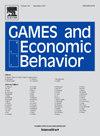Material incentives and effort choice: Evidence from an online experiment across countries
IF 1
3区 经济学
Q3 ECONOMICS
引用次数: 0
Abstract
We conduct an interactive online experiment framed as an employment contract. Subjects from the US, India, and Africa are matched within and across countries. Employers make a one-period offer to a worker who can either decline or choose a high or low effort. The offer is restricted to be from a variable set of possible contracts. High effort is always efficient. Some observed choices are well predicted by self-interest, but others are better explained by conditional reciprocity or intrinsic motivation. Subjects from India and Africa follow intrinsic motivation and provide high effort more often. US subjects are more likely to follow self-interest and reach a less efficient outcome on average, but workers earn slightly more. We find no evidence of stereotypes across countries. Individual characteristics and stated attitudes toward worker incentives do not predict the behavioral differences observed between countries, consistent with cultural differences in the response to labor incentives.
物质激励和努力选择:来自各国在线实验的证据
我们进行了一个互动的在线实验,框架为雇佣合同。来自美国、印度和非洲的受试者在国家内部和国家之间进行匹配。雇主向员工提供一份为期一段时间的工作,员工可以选择拒绝,也可以选择努力程度高或低。要约被限制为来自一组可变的可能的合同。努力总是有效率的。一些观察到的选择可以很好地由自身利益预测,但其他选择可以更好地由条件互惠或内在动机来解释。来自印度和非洲的受试者遵循内在动机,更经常付出高度努力。美国人更有可能遵循自身利益,平均而言效率较低,但工人的收入略高。我们没有发现各国存在刻板印象的证据。个人特征和对工人激励的态度不能预测国家之间观察到的行为差异,这与对劳动力激励的反应中的文化差异是一致的。
本文章由计算机程序翻译,如有差异,请以英文原文为准。
求助全文
约1分钟内获得全文
求助全文
来源期刊

Games and Economic Behavior
ECONOMICS-
CiteScore
1.90
自引率
9.10%
发文量
148
期刊介绍:
Games and Economic Behavior facilitates cross-fertilization between theories and applications of game theoretic reasoning. It consistently attracts the best quality and most creative papers in interdisciplinary studies within the social, biological, and mathematical sciences. Most readers recognize it as the leading journal in game theory. Research Areas Include: • Game theory • Economics • Political science • Biology • Computer science • Mathematics • Psychology
 求助内容:
求助内容: 应助结果提醒方式:
应助结果提醒方式:


